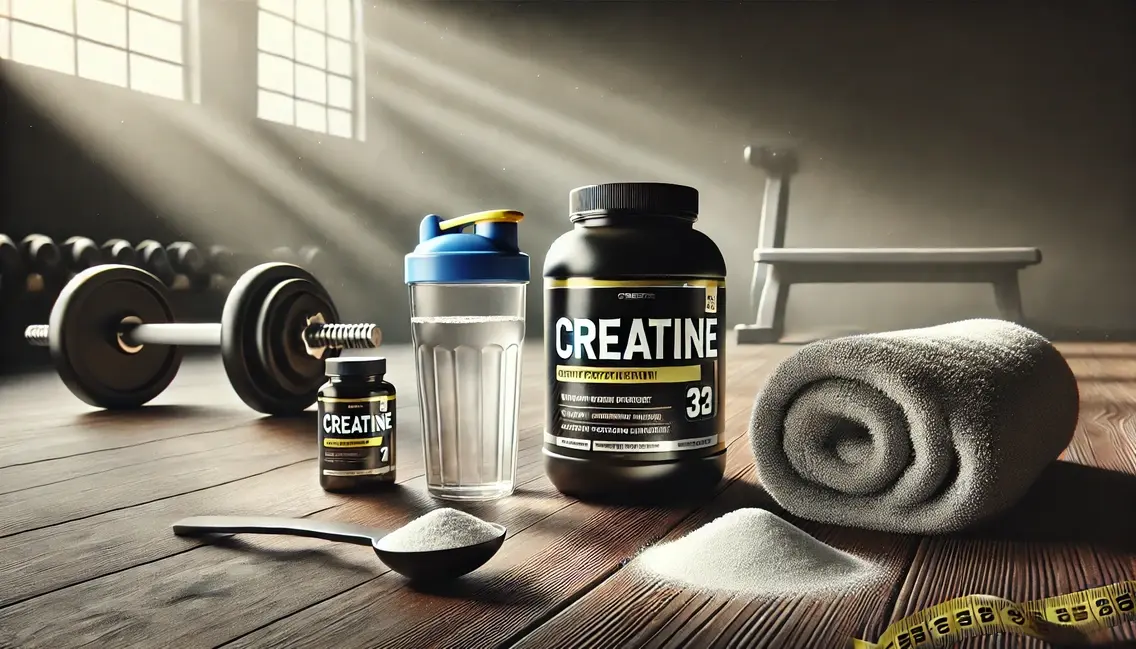The Ultimate Game-Changer: Unleashing the Truth About Creatine
What if there was a supplement that could revolutionize your workouts, catapult your muscle growth, and even sharpen your mind—all backed by scientific research? Enter creatine: the game-changing powerhouse that’s been both revered and misunderstood in the fitness community for decades. Known for its role in enhancing energy at the cellular level, creatine allows athletes to push boundaries they once thought impossible, with benefits verified by the International Society of Sports Nutrition. Yet, misconceptions persist: is it truly safe, and are the alleged side effects myth or fact?
Here, we unravel the mysteries surrounding creatine, supported by peer-reviewed studies and expert insights. Whether you’re concerned about potential side effects or unsure of the best way to incorporate it into your regimen, we’ve got the answers. Ready to discover how creatine can potentially transform your fitness journey and why it's a must-have for serious athletes? Let’s dive into the science—and you won’t believe what we uncovered...
Health Benefits of Creatine
Creatine is a staple in the health and fitness sphere, prized for its remarkable ability to boost performance. This supplement plays a crucial role in energy production, muscle development, and potentially even cognitive enhancement, making it indispensable for athletes and fitness enthusiasts aimed at maximizing their exercise results.
Key Health Benefits
- Enhances Physical Performance
Creatine amplifies the availability of ATP (adenosine triphosphate), the primary energy source for muscle cells during high-intensity workouts. This surge in energy contributes to improved performance in strength and power exercises, a benefit substantiated by the International Society of Sports Nutrition.
- Supports Muscle Growth
Taking creatine regularly is linked with increased muscle mass, a result of boosted cellular hydration and protein synthesis. This makes it a favoured supplement among those who engage in resistance training and bodybuilding.
- Improves Recovery
Supplementing with creatine can expedite recovery post-exercise by minimizing muscle cell damage and inflammation. Research suggests this can enhance workout performance over time and lessen muscle soreness.
- Potential Cognitive Benefits
Emerging evidence points towards creatine's favorable impact on brain function. By potentially enhancing the brain’s energy supply, it may support cognitive processes and memory, although further research is required for a definitive understanding.
Integrating Creatine into Your Routine
With its wealth of proven benefits, creatine is an exceptional choice for those seeking to boost their physical abilities and possibly improve cognitive functions. For Canadians particularly focusing on their fitness and recovery efforts, considering a high-quality option like the Organika Canadian-Made Pure Micronized Creatine Monohydrate – 5g per serving can support muscle mass and accelerate recovery, integrating seamlessly into a workout regimen.
Dietary Sources of Creatine
While creatine is often associated with supplements, it is also found naturally in a variety of animal-based foods. Gaining a clear understanding of these sources can be beneficial, especially if you are an athlete or engage in high-intensity workouts. However, many individuals find it challenging to meet daily creatine requirements through diet alone, making supplementation a practical option.
Natural Sources of Creatine
- Red Meat
Red meats, including beef and lamb, are among the richest dietary sources of creatine. They supply substantial amounts of this compound, which is crucial for sustaining muscle energy and enhancing physical performance.
- Poultry
Poultry, like chicken and turkey, contains creatine, but in smaller quantities than red meat. It can still contribute to your daily creatine intake when combined with other animal proteins in your diet.
- Fish
Fish varieties such as herring and tuna provide creatine, and are also rich in omega-3 fatty acids, supporting cardiovascular health as an added benefit.
Overcoming Dietary Challenges
Despite the presence of creatine in these foods, many people struggle to consume sufficient amounts naturally. This is especially true for vegetarians or those who prefer plant-based diets, where creatine is virtually absent. In such cases, supplementation becomes a viable and effective solution. Enhance your workout performance with Organika Canadian-Made Pure Micronized Creatine Monohydrate, offering 5g per serving to support muscle mass and recovery, ensuring that you meet your daily requirements conveniently. Incorporating a well-considered mix of natural and supplemented sources can support energy production and optimize athletic performance.
Daily Intake for Creatine
Creatine is widely recognized for its role in enhancing muscle strength, power, and recovery by boosting the availability of ATP in your cells, which is crucial during high-intensity exercise. It is safe for most individuals, with its benefits well-supported by extensive research.
Recommended Daily Intake
Staying consistent with your creatine intake is vital for reaping its full benefits. Let's break down the guidelines for proper consumption:
Importance of Consistency
Consistency in your creatine consumption helps maintain optimal levels in your muscles, which is key to ensuring continuous energy support during your workouts. Research demonstrates that maintaining these levels can translate into noticeable improvements in exercise performance and recovery.
Optimizing Your Creatine Intake
For maximum benefit, it's recommended to mix creatine with water or a carbohydrate source, such as a fruit juice, to enhance absorption. While creatine can be taken any time of day, some studies suggest that post-workout consumption may further aid in muscle recovery and growth.
For those seeking a reliable source, consider integrating Organika's Canadian-Made Pure Micronized Creatine Monohydrate into your regimen. With 5 grams per serving, it supports both muscle mass and recovery, meeting your daily intake needs conveniently.
Next, we'll delve into the potential symptoms of creatine deficiency and strategies to maintain optimal levels.
Deficiency of Creatine
Creatine is crucial for maintaining energy reserves in muscle tissues, yet deficiencies can happen, often with impactful outcomes. Such deficits not only compromise physical vitality but can also diminish cognitive functioning.
Deficiency Symptoms and Consequences
- Muscle Weakness and Fatigue
Creatine acts as a standby energy source, critical for muscle contractions. Inadequate creatine reduces ATP availability, leading to muscle weakness and rapid fatigue, especially during strenuous workouts.
- Reduced Exercise Performance
Without sufficient creatine, physical performance suffers. This manifests as diminished power output and endurance, most noticeable during high-intensity, short-duration exercises that rely on anaerobic energy systems.
- Cognitive Impairments
Beyond muscles, creatine is vital for brain health. A deficiency can impair cognitive abilities and mental acuity, particularly in situations demanding rapid energy turnover.
Preventing Creatine Deficiency
Preventing a creatine shortfall is vital for both athletic and cognitive function. Incorporate creatine-rich foods like meat and fish into your diet, or consider supplementation, especially if you face dietary restrictions or metabolic challenges. Many fitness enthusiasts advocate for supplementation to ensure optimal performance. For those seeking a reliable source, enhance your workout performance with Organika Canadian-Made Pure Micronized Creatine Monohydrate – 5g per serving to support muscle mass and recovery!
Curious about whether creatine supplementation is right for you or wondering about practical concerns and common misconceptions? Continue to our FAQ section to gain a deeper understanding and address any lingering questions.
Conclusion
Creatine is more than just a supplement; it's a catalyst for pushing past your perceived limits—both in the gym and beyond. By playing a critical role in energy production, muscle growth, and potentially even cognitive function, creatine stands as a transformative ally in fitness. But it’s the clarity of its science-backed benefits that sets it apart, offering not only gains in performance but insight into your commitment to health and physical excellence.
As you reflect on the unleashed potential within those tiny creatine molecules, ask yourself: are you ready to harness this powerhouse to redefine your capabilities? Whether you're striving to boost your workout performance, accelerate recovery, or explore its cognitive benefits, the time to act is now. Start by incorporating creatine into your routine mindfully—choosing reliable sources and maintaining consistency is key.
Join the conversation and share your creatine experience: What's your take on its effects or the myths surrounding it? Your insights might inspire someone else’s journey. Remember, the power of creatine is not just in its benefits but in how you choose to integrate it into your lifestyle. Fuel your ambitions, and let’s elevate our fitness goals together—because peak performance is within reach, and it's time to claim it.

